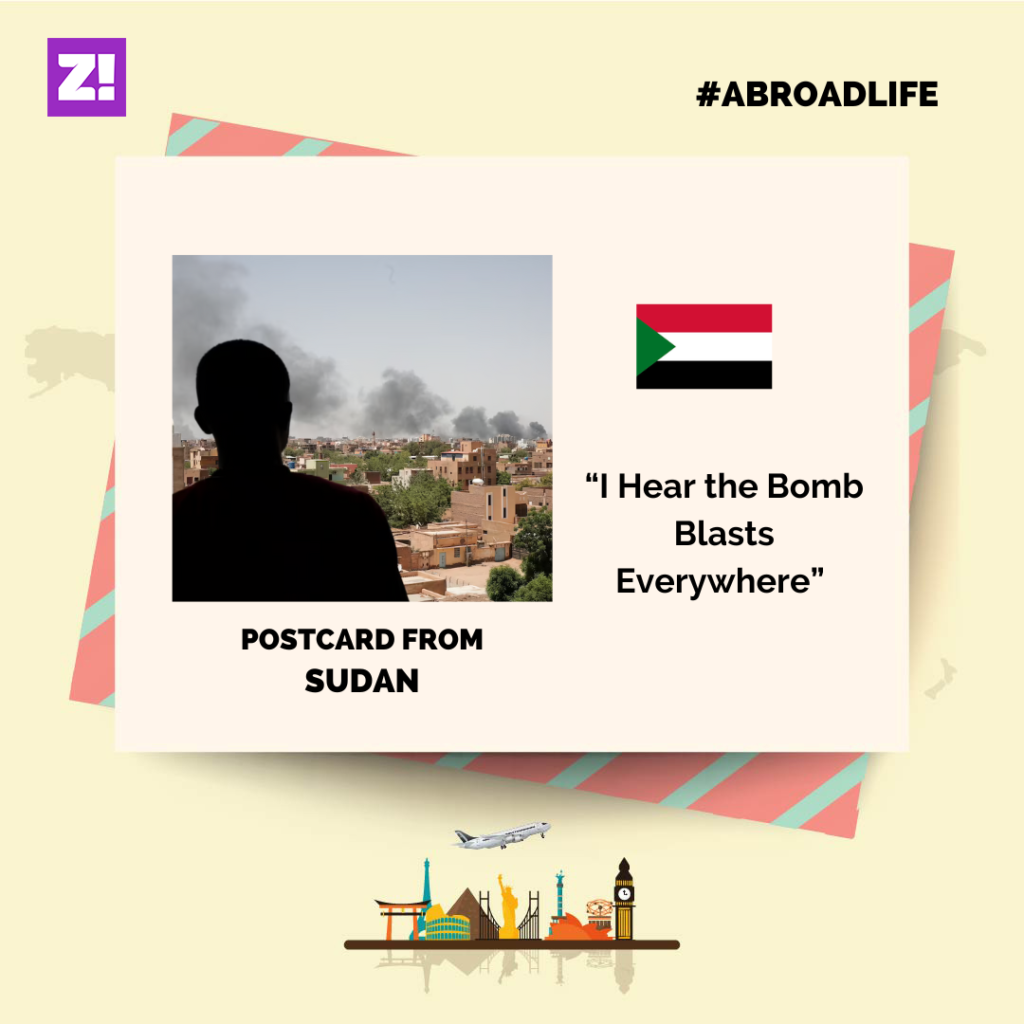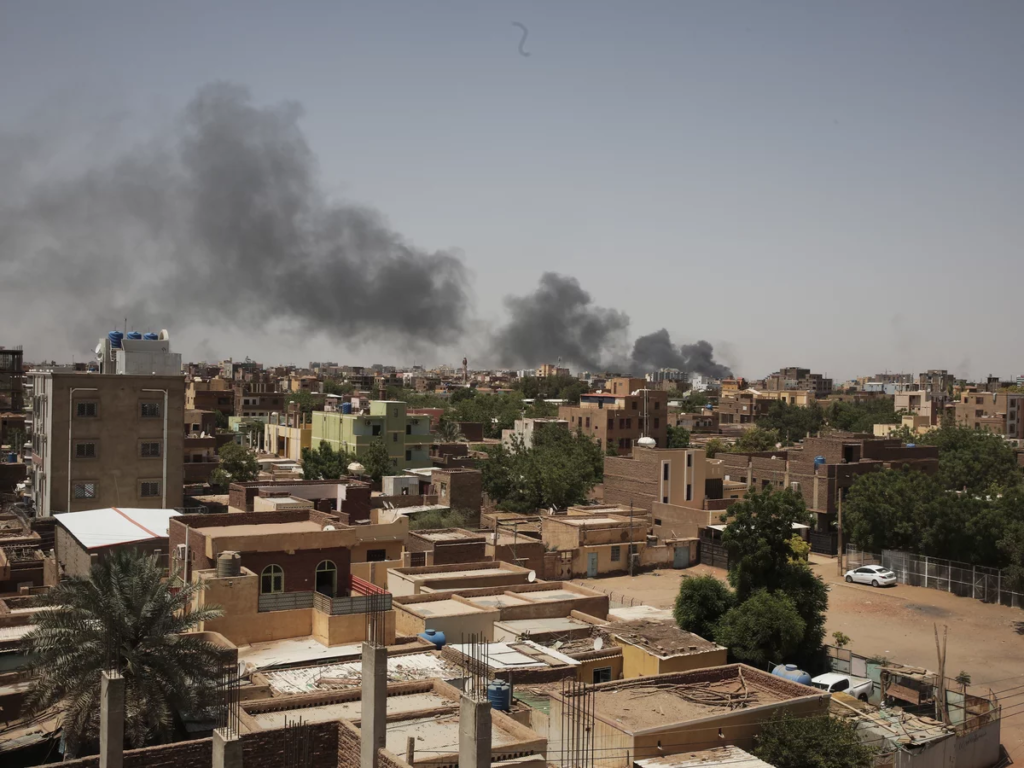The Nigerian experience is physical, emotional, and sometimes international. No one knows it better than our features on #TheAbroadLife, a series where we detail and explore Nigerian experiences while living abroad.
For Islamic student Umar, April 15, 2023, was one of the worst days of his life. He was a student in Khartoum, Sudan, when the Sudan conflict started. He tells us of life before Sudan, the day of the conflict, being stuck 300km away in Arbatah with other Nigerians, and how he hates hearing nothing but bomb blasts everywhere.
Editorial Note: The interview was granted on May 1, 2023, and new events have overcome some of the information in the story.

What was life like before schooling in Sudan?
It was a very normal one. I’m from Katsina state, and my family is a close-knit one. I had schooled all my life in Katsina until it was time for my higher degree at the International University of Africa (IUA) in Khartoum, Sudan, to study Islamic Education. IUA was highly recommended as a good school for the course by a family friend, and Sudan was described as a country with a peaceful environment.
But has it been peaceful?
Up until now, yes. At the start of the Ramadan period in March, I won’t have believed anyone that would have said there would be war in Sudan. Classes were still ongoing. I was preparing for semester exams. Festivities were still being held around the streets of Khartoum. Nobody expected this. Schooling in Sudan has been great, and the teachers are excellent.
What was your experience like on the first day of the attack?
So the attacks started during the Ramadan period. I was in my dorm room and had taken my iftar to break my fast around 6:30 p.m. My eyes were drowsy and so, I took a nap. I then woke up at 8:30 p.m. to gunshots and bomb explosions. I then opened my window and noticed that a large crowd of people were gathered outside to see what was going on. Many people were scared and shocked (and still are) because they had never experienced conflict before.

Smoke is seen in Khartoum, April 22. The fighting between the Sudanese Army and Rapid Support Forces in the capital resumed after an internationally brokered cease-fire failed. [Marwan Ali/AP]
How have you been surviving the attacks?
Sadly, nothing has improved, despite the 16th day of conflict and many promises of a “ceasefire”. I have been unable to sleep properly for 16 days because of the constant sounds of gunshots and bombs. There is no peace of mind for me to even think of sleeping.
For daily amenities, I was managing. Back at IUA, food had started to run out, and there was hardly any water. Sometimes I had to go some days without bathing. There is hardly any electricity to charge one’s appliances. The only hope I had was with the Nigerian government to evacuate us.
Did you witness casualties?
No, I didn’t—just a shortage of essential amenities.
What happened on the day of evacuation?
On April 23, the Nigerian government came with only ten buses out of the 50 they promised. It was agreed that 13 buses would be used to transport the first batch of students, but they are still stuck at the Aswani border until now.
No other bus came here until April 30, when the evacuation team came in with 26 buses. They said we were to go to Egypt, but we’ve not been there because the first batch is still stuck. They changed plans and said we should go to Port Sudan. We entered the bus using our states of origin and left Khartoum at midnight. We’ve stopped at Artrabah, 300km from Khartoum and a 7-hour journey. It remains 7 hours until we reach Port Sudan.
However, we’ve been stuck at Arbatah for the past eight hours.

Nigerians in Sudan waiting to be evacuated [El-Tayeb Siddiq/Reuters]
Why?
This is because the driver complained that the Nigerian Diaspora Commission (NIDCOM) has refused to pay the driver the fares needed. There has yet to be a response from the Nigerian Embassy or government officials. I hope they will come through soon.
Do your family know where you are?
I’ve decided not to tell my parents. I told them on April 30 that we were coming to Egypt. Telling them now that I am stuck in Arbatah may probably break their heart. I just want the Federal Government to handle this properly.
Do you feel safe where you are?
Yes, I do. We are several kilometres away from the conflict zone, and the people in Arbatah have been warm and friendly so far. If not for social media, I’m not sure they’d even be aware of the conflict in Sudan.
Are you getting access to basic amenities?
Yes, I am. There is food and water, and we use the USB cords inside the buses to charge devices for electricity. The only downside to me on this is the high prices of things here. You can purchase 1 bottle of water for almost 500 Sudanese pounds (₦400). There is also the toilet, which is always very dirty and makes me afraid of getting severe toilet infections. But what can I do? No one cares about the state of a toilet in the middle of a war.
Asides that, we’re all good.
What has traumatised you the most about this experience?
The jet fighters keep flying about, and the gunshots and bomb blasts. I have started hearing them everywhere now without wanting to. They don’t allow me to sleep.
So sorry to hear this. What would your next plans be when you land in Nigeria?
I will go and see my family first and celebrate with them while thanking Allah for bringing me safely home. I’d then discuss schools I can attend in Nigeria with my parents. Sudan was a lovely place, but with recent happenings, I’ve come to accept that there is no place like home. And then, hopefully, I will hear the bomb blasts no more. I will lay on my bed and finally get some sleep.
Editorial note: The Nigerians in Diaspora Commission (NIDCOM), on May 3, announced the successful evacuation of the first batch of 376 evacuees. More people are expected to be evacuated over the next week.




